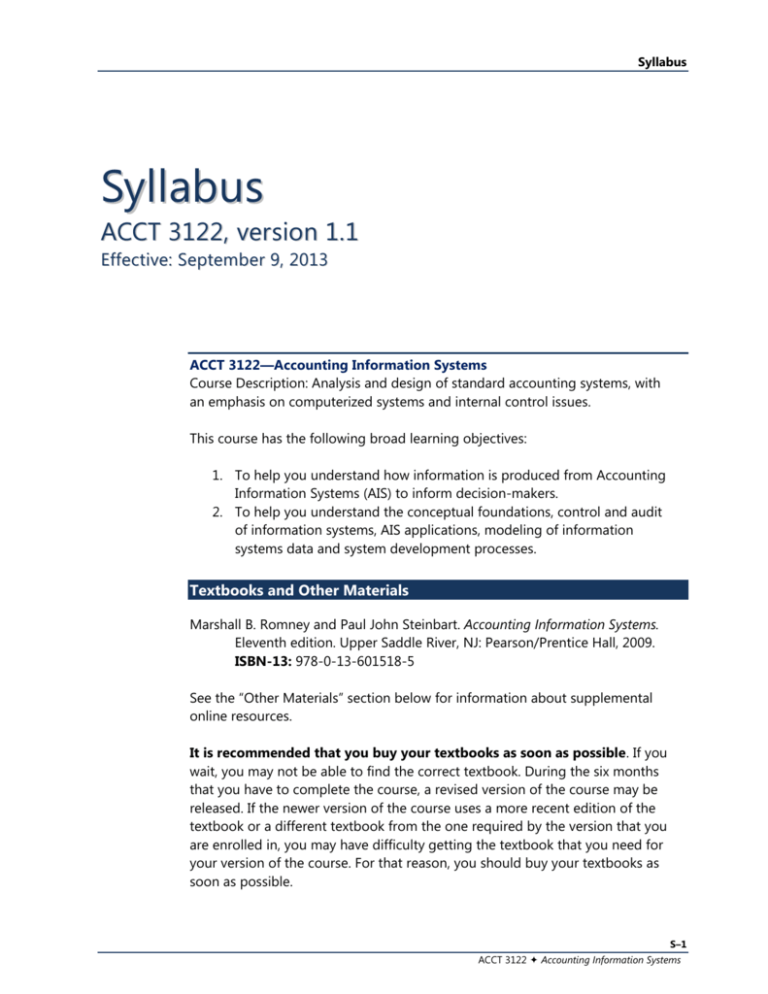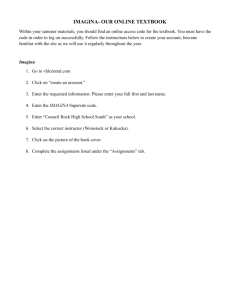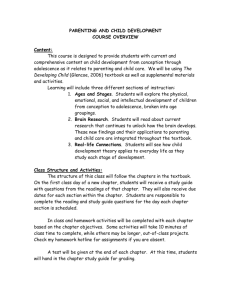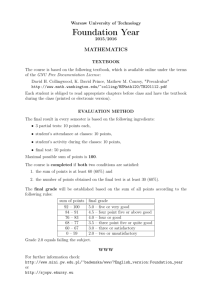
Syllabus
Syllabus
ACCT 3122, version 1.1
E f f e c t i v e : S e p te m b e r 9 , 2 0 1 3
ACCT 3122—Accounting Information Systems
Course Description: Analysis and design of standard accounting systems, with
an emphasis on computerized systems and internal control issues.
This course has the following broad learning objectives:
1. To help you understand how information is produced from Accounting
Information Systems (AIS) to inform decision-makers.
2. To help you understand the conceptual foundations, control and audit
of information systems, AIS applications, modeling of information
systems data and system development processes.
Textbooks and Other Materials
Marshall B. Romney and Paul John Steinbart. Accounting Information Systems.
Eleventh edition. Upper Saddle River, NJ: Pearson/Prentice Hall, 2009.
ISBN-13: 978-0-13-601518-5
See the “Other Materials” section below for information about supplemental
online resources.
It is recommended that you buy your textbooks as soon as possible. If you
wait, you may not be able to find the correct textbook. During the six months
that you have to complete the course, a revised version of the course may be
released. If the newer version of the course uses a more recent edition of the
textbook or a different textbook from the one required by the version that you
are enrolled in, you may have difficulty getting the textbook that you need for
your version of the course. For that reason, you should buy your textbooks as
soon as possible.
S–1
ACCT 3122 Ø Accounting Information Systems
Syllabus
If you have trouble finding a book, check the list of recommended
bookstores on our website and order by the ISBN, not the title. If you are
outside of the Baton Rouge area and try to buy your textbook locally or from
an online bookstore and have difficulty locating the correct textbook or the
required edition, please call one of the recommended bookstores. These
bookstores try to maintain an inventory of all our textbooks. Be sure to specify
that you need a textbook for the LSU Online or Independent & Distance
Learning version of the course and verify the ISBN number to make sure you
get the correct edition of the textbook.
Other Materials
Access to flowcharting software such as PowerPoint, Excel, Word, and Visio is
required.
Pearson/Prentice Hall provides a textbook Companion Website at
http://wps.prenhall.com/bp_romney_ais_11/86/22157/5672205.cw/index.html
that you may access at no extra cost. After the initial reading of the chapter, it is
recommended that you access the Companion Website and review the
publisher's PowerPoint presentation, study guide, and study questions for that
chapter.
Reading Assignments
You will read an average of 25 pages per module. Specific reading assignments
will be given for each module.
Topic Outline
This course covers the following specific topics:
Module
Topic
Chapter in
Textbook
1
Accounting Information Systems: An
Overview
1
2
Overview of Business Processes
2
3
System Development and Documentation
Techniques
3
4
Relational Databases
4
5
Computer Fraud and Abuse
5
EXAMINATION I
6
Control and Accounting Information Systems
6
7
Information Systems Controls for Systems
Reliability: Information Security
7
S–2
ACCT 3122 Ø Accounting Information Systems
Syllabus
8
Information Systems Controls for Systems
Reliability: Confidentiality, Privacy, Processing
Integrity, and Availability
8
9
Auditing Computer-Based Information
Systems
9
10
The Revenue Cycle
10
EXAMINATION II
11
The Expenditure Cycle
11
12
The Production Cycle
12
13
The Human Resources Management and
Payroll Cycle
13
14
General Ledger and Reporting System
14
FINAL EXAMINATION
Submission of Module Assignments
Remember, this course covers an entire semester of work or the equivalent of a
classroom course lasting 15 weeks. That means that each module in this course
equals nearly a week of course work and will require the same time and effort
on your part. Do not expect to complete each lesson in a single study session.
Submit your module assignments as soon as they are completed. If you are
uploading documents, be sure to put your name, course number, and module
number at the top right hand corner of each page. Number pages 1 of __, etc.
Be sure to keep a backup copy of your work. Follow any additional instructions
listed below.
Course Specific Instructions
Carefully study the textbook material before you begin to prepare the module
assignments. This study should include a detailed examination of the illustrative
problems and examples, as well as the assigned reading.
Available through the textbook companion website are detailed PowerPoint
presentations and study guides containing multiple choice, true or false, and
essay questions to supplement your study. After the initial reading of the
chapter, it is recommended that you access the companion website and review
the publisher's PowerPoint presentation and study guide for that chapter.
S–3
ACCT 3122 Ø Accounting Information Systems
Syllabus
Suggested Study Techniques
Carefully study the textbook, module material (if applicable), additional
resources provided, and the information in your online course guide before you
begin to prepare the module assignments. This study should include a detailed
examination of the illustrative problems and examples, as well as the assigned
reading. After an assignment has been completed, a rapid re-reading of the
related text and other materials is strongly recommended.
Review your module assignments after they have been graded and returned to
you. LSU Online suggests that you wait for your first assignment to be graded
before you submit subsequent assignments.
One temptation you may have in an independent study course is to rely too
heavily on textbook material when preparing your assignments. If you give in to
such a temptation, you may not realize until exam time that the perfect
response you prepared was possible only because you repeatedly referred to
the textbook without really learning or understanding the material. Therefore,
you should attempt each assignment without referring to the textbook, and if
“thumbing back” is necessary, be sure you have actually learned the point
rather than merely reflected it in the answer.
Put yourself on a definite schedule. Set aside a certain block of hours per day or
week for this course and work in a place where distractions are minimal. Try to
submit an assignment each week or at least every two weeks. Delays in
submitting assignments usually result in lagging interest and the inability to
complete the course.
Academic Integrity
LSU Online adheres to Louisiana State University’s policy on academic
misconduct. This policy defines plagiarism as follows:
“Plagiarism” is defined as the lack of citation or the unacknowledged
inclusion of someone else’s words, structure, ideas, or data. When a
student submits work as his/her own that includes the words, structure,
ideas, or data of others, the source of this information must be
acknowledged through complete, accurate, and specific references, and,
if verbatim statements are included, through quotation marks as well.
Failure to identify any source (including interviews, surveys, etc.),
published in any medium (including on the internet) or unpublished,
from which words, structure, ideas, or data have been taken, constitutes
plagiarism; Plagiarism also includes:
S–4
ACCT 3122 Ø Accounting Information Systems
Syllabus
Falsifying or fabricating any information or citation in any
academic exercise, work, speech, thesis, dissertation, test, or
examination.
Submission of essentially the same written assignment for two
courses without the prior permission of the instructors.1
Examinations and Grading Policy
There will be three multiple-choice examinations. Examination I follows Module
5 and Examination II follows Module 10. The Final Examination, which is
comprehensive, follows Module 14. However, 60 percent of the Final
Examination will test new material in Chapters 11–14, with the remainder
covering prior material.
Module assignments count 100 points each. Exams are 100 points each.
Course grade = average of lesson assignments + exam scores.
The following grading scale applies:
90%
80%
70%
60%
0%
− 100% = A
− 89% = B
− 79% = C
− 69% = D
− 59% = F
Component
Weight (%)
Module Assignments
25%
Exam I
25%
Exam II
25%
Final Exam
25%
YOU MUST PASS THE FINAL EXAMINATION IN ORDER
TO PASS THE COURSE.
1
LSU Code of Student Conduct, Section 8.1.C.6,
http://saa.lsu.edu/sites/saa.lsu.edu/files/attachments/8.pdf (last accessed September 9,
2013).
S–5
ACCT 3122 Ø Accounting Information Systems
Syllabus
Taking Your Examinations
You are required to take your examinations through ProctorU, a remote
proctoring service that allows you to take exams anywhere with internet access.
To find out how ProctorU works use the link below to go to the ProctorU
website. Please note that you must have the technical requirements to test
using ProctorU, including access to a web cam with a microphone (built-in
or external), headphones or working speakers, and high speed internet to
use this service. A complete list of technical requirements is available from the
ProcturU website.
When you are ready to create an account and schedule your exam, go to
http://proctoru.com/lsu_outreach/. You should schedule your exam about a
week before you are ready to take it.
The final exam cannot be taken until you have been enrolled in the course for
at least eight weeks, regardless of when the modules and other exams are
completed. Under no circumstances may the final exam be taken earlier. To
read the full exam policy and other policy statements, visit
http://cms.outreach.lsu.edu/cms/CEHomePage.aspx. Click on Extended
Campus, select LSU Online, and then click the link for Policies.
Transcript Information
After you have completed this course, your grade will be filed with the Office of
the University Registrar. If a transcript is needed, it is your responsibility to
make a request to the registrar. If you would like to order a transcript, visit the
Office of the University Registrar Transcript Requests2 page to view your
options.
Copyright
ACCT 3122 Accounting Information Systems
Copyright © 2011 LOUISIANA STATE UNIVERSITY
BATON ROUGE, LOUISIANA
Samuel Tiras, author
Department of Accounting
Louisiana State University
All rights reserved. No part of this material may be used or reproduced without
written permission of LSU Online. Created in the United States of America.
ED
2
http://sites01.lsu.edu/wp/registraroffice/student-services/transcript-request/
S–6
ACCT 3122 Ø Accounting Information Systems





